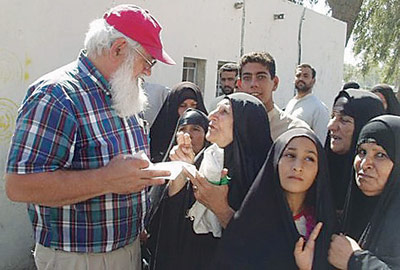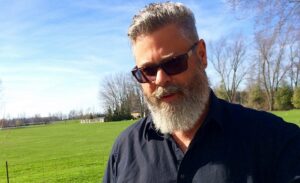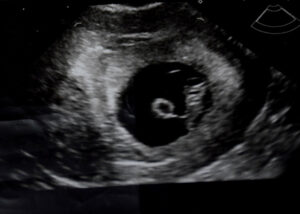Gene Stoltzfus, the founding director of Christian Peacemaker Teams (CPT), died of a heart attack in Fort Frances, Ont., while bicycling near his home on the first spring-like day of the year. He is survived by wife Dorothy Friesen and many peacemakers who stand on the broad shoulders of his 70 years of creative action.
Stoltzfus was at the heart of those who planted and nurtured the vision for teams of peacemakers partnering with local communities in conflict zones to build justice and lasting peace. This vision grew into CPT, with Stoltzfus playing key roles in CPT’s founding gathering of Christian activists, theologians and other church leaders at Techny Towers outside Chicago in 1986.
Two years later, he became the first staff person of the newly formed organization, and continued as CPT’s director for the next 16 years. In the early years, Stoltzfus and CPT’s steering committee experimented with various approaches to activate faith-grounded peacemaking. Through the early 1990s, he gave leadership to solidifying the vision and practice of sustained teamwork in situations of lethal conflict. During the late ’90s and early years of this decade, he guided CPT through its growth and maturation as an organization supporting nonviolent action around the world.
Stoltzfus travelled to Iraq immediately before the first Gulf War in 1991, and spent time with the Iraq CPT Team in 2003 to facilitate consultation with Muslim and Christian clerics, Iraqi human rights leaders and families of Iraqi detainees, all the while talking with American administrators and soldiers. The team’s work contributed to the disclosures of abuse at Abu Ghraib Prison that gave impetus to the still-tentative worldwide movement for military forces to attend to the rights and protection of civilians and prisoners.
From mid-December 2001 to mid-January 2002, Stoltzfus and current CPT co-director Doug Pritchard were in Pakistan and Afghanistan listening to the victims of bombing and observing the effects of 23 years of violence—much of it fed by forces from outside Afghanistan.
“Where have you been all these years?” asked an Afghan leader, articulating the voices of others around the globe.
Stoltzfus’s commitment to peacemaking was rooted in his Christian faith and experience in Vietnam, where he served as a conscientious objector with International Voluntary Services during the mid-1960s, when U.S. military action there was escalating. He recalled watching the helicopter personnel unload their cargo of bloodied bodies. He said this experience set him “on the search to make sense of life and death where the terms of survival, meaning and culture approve and even train for killing.”
He had to ask himself if he was willing to die for his conviction of loving the enemy just as Vietnamese and American soldiers all around him were being asked to give their lives in order to achieve peace and security.
In the early 1970s, Stoltzfus directed a domestic Mennonite Voluntary Service program with a view to engaging with the social justice and peacemaking needs of that day. He recognized then the enormous importance of local, disciplined, trained community and congregationally based peacemaking efforts.
Later that decade, he and his wife co-directed the Mennonite Central Committee program in the Philippines during President Marcos’s martial law era, focusing on human rights and economic justice. The couple then went on to help establish Synapses, a grassroots international peace and justice organization in Chicago, to connect the United States and people in the developing world.
Stoltzfus grew up in Aurora, Ohio, then a rural town in the northeast part of the state, where his parents gave leadership in a Mennonite church and his father was the pastor. He graduated with a degree in sociology from Goshen College, Ind., and earned master’s degrees in south and southeast Asian studies from American University, Washington, D.C., and divinity from Associated Mennonite Biblical Seminary, Elkhart, Ind.
Stoltzfus and Friesen lived in Chicago for 25 years until his retirement to Fort Frances. After retiring from CPT, he travelled widely to speaking engagements, blogged regularly at peaceprobe.wordpress.com, and made twig furniture and jewellery as a contribution to the greening of the world.
The closing paragraph of Stoltzfus’s final post on his blog is an expression of his conviction and hope: “Every one of us is impacted by a dominant culture which insists that military or police force will make things right. Every day, that culture tells us that dirty tricks, usually done in secret, are required for our survival. After all, it’s argued, someone has to do this dirty work. It’s called a noble work and . . . mercenaries are required for the work. It will take an expanding worldwide but grassroots culture reaching beyond national borders to fashion a body of Christian peacemakers to be an effective power to block the guns and be part of transforming each impending tragedy of war. Little by little there will be change.”
More than a hundred locals attended his memorial service at Emo United Church in northwestern Ontario. Other memorials were held around the world in the U.S., Jerusalem, the Philippines and Iraq.
Tributes
Gene was a special person. He was also my friend. By chance, I met him on March 7, just a few days before he died. He and Dorothy were in Winnipeg, and decided to attend worship at my church before heading back to Fort Frances. After the service we spent a few minutes reminiscing about old friends and old times. We promised to stay in touch. That won’t happen, now that he is gone. But Gene Stoltzfus’s legacy lives on.
John Longhurst, Winnipeg
Gene Stoltzfus was indeed larger than life . . . . His spirit, courage, warmth and humble, engaging nature will live long in the hearts of many, from co-workers in the struggle for peace and victims of oppression around the globe, to the children of Emo, Ont., who thrilled to his role of jolly, white-bearded St. Nick.
Thomas Friesen, Vancouver, B.C.
The message of Gene’s death touched me deeply. I know him since the Techny consultation in 1986. Just over a year ago I sat with him at the kitchen table at my home. We talked about getting CPT involvement going in the Netherlands. He was a great help in that starting phase. His presence in congregations and a conference showed a rare mix of empathy, humour and personal conviction. For each audience he had a special way to approach dialogue. This example will stay with me as a guiding image of how to work for peace.
Maarten van der Werf, CPT support group, Netherlands
I like to thank God for having had the opportunity of meeting Gene last year in Berlin. He was an inspiration for my congregation, the Berlin Mennonite Congregation, and for my work.
Martina Basso, director of the Mennonite Peacecenter of Berlin and pastor of the Berlin Mennonite Congregation, Germany










Leave a Reply
You must be logged in to post a comment.